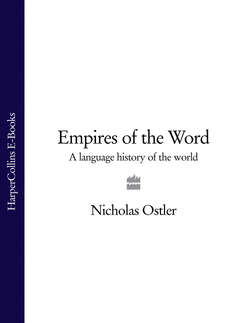Читать книгу Empires of the Word: A Language History of the World - Nicholas Ostler - Страница 27
Careers in parallel
ОглавлениеThe remarkable similarity of the careers of the Egyptian and Chinese languages can first be displayed in the form of two chronological charts. Foreign incursions and cultural influences are marked in boldface type.
Both Egyptian and Chinese history are made up of long periods of stable unitary government, interspersed with intervals of civil unrest, or at least disunity, when there were competing dynasties in different parts of the countries. Egypt has three such periods of stable self-government, the Archaic + Old, the Middle and the New Kingdoms, followed by a Late Period, when foreign rule was the norm rather than the exception. China also has three long periods of indigenous rule, the feudal age of the Shang and Zhou dynasties, the First Empire of the Qin and Han dynasties, and the Second Empire of the Sui, Tang and Song, which then were overlaid by a succession of partial or total alien invasions.
Both civilisations were formed originally along the valley of a single river,
the Nile* and the Huang-he (‘Yellow River’) respectively, although China expanded to take in the next great river valley to the south, the Yangtze Kiang.† And both civilisations demonstrated that, although they were not capable of defending their borders indefinitely, successful invaders stood to be absorbed in the long term. The linguistic analogue of this was that no foreign invaders imposed their language on the population, nor indeed (until the Persians and then the Greeks took Egypt) managed to retain their own language for more than a generation after mastering the country.
These are both tales of solid growth and heroic maintenance, rather than massive spread. This chapter first sketches each language’s history, particularly noting the encounters with languages spoken by foreign intruders: these often came to stay, but tended not to supplant their hosts. Armed with the facts, we can then consider what might be the secrets of such language stability.
